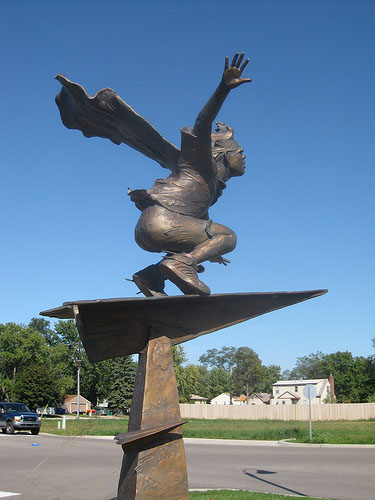In the childhood of any kid, there is a period when he gets obsessed with some technical units – cars, boats, motorcycles. The idea to control it is steadily and exclusively associated with future personal masculinity. I got it really bad with planes. I knew by heart all Soviet films (there were no other at that time) about brave pilots, read all books directly or indirectly related to planes in the home and neighbouring libraries and could easily surprise aviation old-timers by reasoning about the differences in the technique of pulling out of the spin MiG-21 and SU-25. Once, even being a nine-year-old boy, I managed to pass a proficiency exam for the knowledge of the control panel to a real, though a civilian, pilot of Yak-40, which cockpit to visit arranged my caring grandmother during the flight. Of course, I named only half of the instruments and, by and large, could not tell their readings correctly, but the eyes and expression of the moustached face of the tired pilot clearly showed that I passed the exam at least with A+.
Not far from the apartment building where I was growing up was the military airfield of the Kachinsky Higher Military Flight School, and from my window I could see the section of the airway where a turn took place. Watching from my at eight-storeys high window in good weather, with an unusual to a child thoughtfulness, the cadets’ turns on the sparkling and loud L-39s, I sometimes dreamt that they would wink, nod me and rock the wings of their alar horses. Fascinated by a confident manoeuvre of an aluminium bird, I would return to gluing from tiny pieces of plastic another model of a flying machine, usually a military one. Lovingly hanging them under the ceiling on stretched, almost invisible, fishing lines, I dreamed about sharp turns and complex aerobatic manoeuvres, air battles and triumphant “barrel rolls” over my home. All the relatives, who visited our apartment, knew about my simple passion, and some managed to find and gift me new models of planes (it was late USSR with a total deficit of even all basics!), which was filling me with a perfect delight. I was never in a hurry, gluing a newfound copy; I was always slowly drinking the process in, carefully studying every detail of the assembling piece of the dream.
However, time passed, the years accelerated their course, and the gloomy circumstances, which could not be avoided in any possible way, emerged. In addition, it was time to come into adolescence and eventually into adulthood. Life dictated new pragmatic interests, – hobbies and idols, which can be shared with most peers, – and immature dreams should have been left behind. A day has come and, earlier freely soaring under a ceiling of the huge, for a boy, room, the “real” flying machines were taken off and piled up in a heap, as defeated in air combat by an unknown, but very unequal force. I tried to do everything quickly. The only thing I could not do was to break their wings off: those whose breadth was wider than the trash chute mouth were thrown near it. So my childhood was over.

Recently I had a chance to talk to the person supervising strategic development of a large airline. Due to my occupation, I often have to be in different offices and rooms. Over time, I got used to new premises insomuch that practically stopped paying attention to the details of new rooms and buildings, noticing only general points and focusing on a purpose of a visit – we discussed something related to a strategy. This time, however, everything was the exact opposite. I didn’t even remember whether we talked at a meeting table or at a desk: there were real models of planes in the room everywhere! They were confidently placed on the cabinets and the desk, tables and shelves with books, proudly rushing their noses upwards. They were appropriate and simply necessary in this, no, not in the office, but Sanctum. I stood and, it seemed, even slightly opened my mouth, transferred my gaze from TU-134 to Il-62 (exactly the same as it was hanging under my ceiling!). Fighting against the almost a knocking down storm of distant memories, I said only one thing aloud: “I could not even imagine that there could be an adult, a man’s work, doing which, plastic models of aircraft from childhood would not be superfluous”.

Leave a Reply